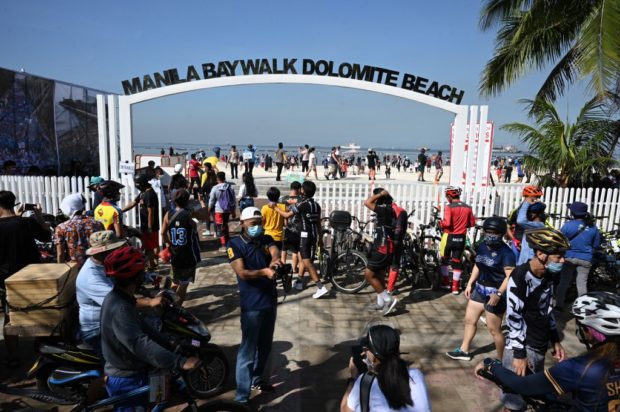Crushed dolomite is not dangerous to health, new DENR OIC insists

People trooping to Manila Bay’s dolomite beach along Roxas Boulevard in Manila city on October 17, 2021, a day after authorities eased its quarantine restrictions in the nation’s capital. (File photo by Ted ALJIBE / AFP)
MANILA, Philippines — The newly-named officer-in-charge of the Department of Environment and Natural Resources (DENR) reaffirmed the stance of the department on the use of crushed dolomite sand to beautify Manila Bay, insisting that it is not dangerous to health.
DENR OIC Secretary Jim Sampluna during a press briefing on Monday was asked about his views of the dolomite beach in Manila Bay, amid health concerns raised by several groups.
Sampluna said absent any study that would indicate that dolomite is dangerous, the DENR would continue using it — stressing that dolomite sand has been used by other countries and in many applications such as aquarium tanks.
“Alam mo, until such time that there is a study that would say that is dangerous for health, I think we will continue (using dolomite). You know, ang hindi po natin alam, ‘yang dolomite na ‘yan ginagamit ‘yan sa filter,” he told reporters.
“Alam niyo ba ‘yong Long Beach sa California, ‘yang Long Beach dolomite po ‘yan. Marami ang mga istasyon sa Sentosa in Singapore, dolomite po ‘yan. So kung totoo ‘yong pinagsasabi nila, bakit ginagamit ng ibang country ‘tong dolomite?” he asked.
Article continues after this advertisementSampluna asked why water animals have not died despite exposure to dolomite sand, which he said is being used in most aquariums and fish tanks.
Article continues after this advertisement“Isa pang hindi natin alam: if it is dangerous to health, bakit ginagamit natin ‘yan sa mga ‘yong isda sa mga tanks? Mga aquarium, dolomite po ‘yan, matagal na dapat po namatay ‘yong isda dyan sa aquarium, ginagamit ‘yan sa maraming bagay,” he explained.
“So unless we find proof, I mean we can read or we find somebody (saying otherwise), hindi ‘yong dahil lang ayaw niyo doon sa project. I’ll tell you frankly, hindi kami maniniwala d’yan,” he added.
The DENR is planning to reopen the Manila Bay beachfront soon following the easing of restrictions in Metro Manila with the downtrend in coronavirus cases.
Undersecretary Jonas Leones said that the beach area would likely be opened to the public before President Rodrigo Duterte steps down from office in June 2022.
“We believe that in our effort to close all outfalls na nagdi-discharge dyan sa Manila Bay and then may makita kayo do’n tini-treat na rin namin ‘yong water along malapit do’n sa dolomite so we are confident na kung tuloy-tuloy ‘yon, hopefully by the end of this administration ni Pangulong Duterte we can beat the standard in terms of water quality,” he assured the public.
The dolomite beach project has been a controversial issue, not only because it was conducted amid the COVID-19 pandemic and when funds were badly needed, but also due to the alleged dangers of dolomite sand.
READ: ‘Saving’ Manila Bay: Dolomite beach, wetlands drowning in wastes
Health experts, even from fellow government agency the Department of Health (DOH), said that there are certain dangers that come with the use of dolomite sand, like the dust causing respiratory issues once inhaled by humans.
It can also cause eye irritation if it comes in contact with the eyes, DOH claimed. However, the department also redacted their claims, saying that the dolomite in Manila Bay would not cause the health risks they mentioned.
But there are other groups who also warned the public about the dolomite sand: according to experts, dolomite can actually contain heavy metals like lead and mercury, which are both dangerous for humans.
READ: Critics see red in Manila Bay’s ‘white sand’ makeover
Meanwhile, there are some individuals who pointed out that several American companies have conducted studies on dolomite, which noted that it may cause cancer. Another research says dolomite contains crystalline silica which is classified as a potential carcinogen or a substance that contributes to cancer.
Former DENR secretary Roy Cimatu, who resigned due to health reasons and whom Sampluna replaced, maintained in the past that the sands present no danger to human health.
RELATED STORY:
Kalikasan writ eyed against Manila Bay white sand project
EDV
For more news about the novel coronavirus click here.
What you need to know about Coronavirus.
For more information on COVID-19, call the DOH Hotline: (02) 86517800 local 1149/1150.
The Inquirer Foundation supports our healthcare frontliners and is still accepting cash donations to be deposited at Banco de Oro (BDO) current account #007960018860 or donate through PayMaya using this link.